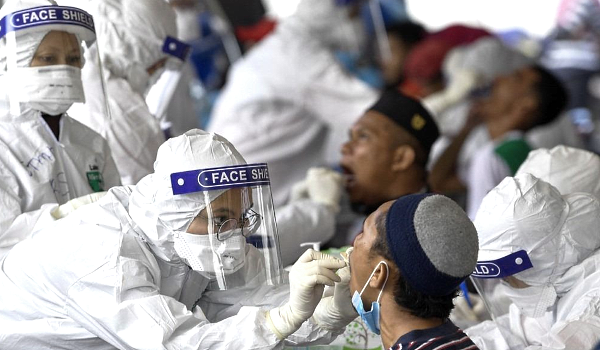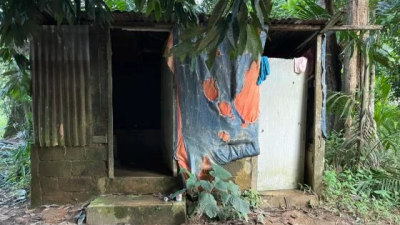Sin Chew Daily
Science, technology and innovation minister Khairy Jamaluddin said on Tuesday that under the national immunization program, the original target was to have 80% of the country's population inoculated by the end of this year.
He also said prime minister Tan Sri Muhyiddin Yassin had instructed to expedite the rate of vaccination due to the severity of the COVID-19 outbreak in the country.
We actually don't need the prime minister to remind us how bad the situation is, by just taking a look at the country's economy and how much additional financial expenses have been made over the past one year.
Putting the whole year's budget of RM322.54 billion aside, the seven assistance packages alone would take up RM340 billion, not to mention the RM80 billion in GDP loss for 2020. And the latest nationwide lockdown is going to cost the country another RM40 billion, sending the total economic loss to RM460 billion. We haven't even taken into account the cost of over 590,000 infections and almost 3,000 deaths from the coronavirus, including healthcare resources, funeral cost, screening expenses and psychological loss of broken families.
We have to admit that some Malaysians are very uncooperative. As health DG Noor Hisham Abdullah has said, many people treat the SOPs as transparent.
Indeed, if Malaysians had been more cooperative, even if the Ramadan bazaars were allowed to operate until 2am, they would not have rushed to do their festive shopping and infection risks would have been dramatically reduced.
Nationwide lockdown is only an expedient plan as it involves tremendous cost, produces limited effects and is extremely damaging to the country's economy, especially if the people don't cooperate.
As such, the only way to get rid of the virus is to get the whole population inoculated, and the cost of immunization program is merely 1% of the RM460 billion economic loss incurred during the pandemic.
So, wait no more and register for your jabs right now!

Last year, many foreigners rushed to flee the UK at the peak of the country's pandemic. But on Tuesday, we were told that after 15 months being brutalized by the virus, the UK achieved the "zero death" goal for the first time, thanks to its enviable 95.63% vaccination rate.
From the administration of the world's first COVID-19 vaccine dose on December 8 last year to May 31 this year, they took only 174 days to almost achieve the goal of immunizing the whole population. This country of cumulative 4.49 million confirmed cases and 127,700 deaths is telling the entire human race that vaccination is our only bet to defeat the virus.
UK has a population of 66.8 million, about twice of Malaysia. Barring any issue with the vaccine supply, if public and private healthcare institutions are fully mobilized for the national immunization program, we still have 214 days until the end of the year, and the UK only spends 174 days to achieve the full vaccination target. If the UK can, so can we!
Khairy said the COVID-19 Immunization Task Force (CITF) is working very hard to increase the number of vaccine doses with the hope of administering 200,000 doses daily by the end of July.
Let's make a preliminary estimation: if 100,000 doses are administered each day from now until end of July, and 200,000 doses thereafter, we should be able to achieve our goal by end of November. Of course, the earlier this is achieved, the less traumatic the economic damage will be and fewer people will get killed by the virus.
Vaccine supply remains the key factor to determine the rate of vaccination. The 12 million Sinovac doses we have ordered are expected to arrive here by the end of next month, while 25 million Pfizer-BioNTech doses will be delivered in the third quarter of the year.
Additionally, Khairy said the National Pharmaceutical Regulatory Agency (NPRA) is currently vetting China's Cansino vaccine.
Meanwhile, Sinovac has been approved by the WHO for emergency use and this should help boost the public's confidence in this vaccine.
Now that more vaccines are on the way here, we should set up more vaccination centers (PPV). Other than large PPVs, Khairy said PPVs set up at private hospitals and clinics have also started operating. About 1,000 private clinics in the country will join the immunization program by the end of this month, making vaccination way more convenient for many people.
In addition, the government has also set up drive-through PPVs and mobile vaccination centers for rural areas.
In the meantime, we should also be concerned about the 80,000 plus (14.21% of total) COVID-19 patients below the age of 18. In neighboring Singapore, school children between the age of 12 and 18 have started receiving Pfizer and Moderna vaccine jabs from June 1, and our government should also look into the feasibility of such exercise.
Finally, we also have more than six million legal as well as undocumented migrant workers who should also be included in the national immunization program, for humanitarian reasons or to break the infection chain.
ADVERTISEMENT
ADVERTISEMENT


































